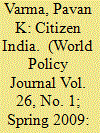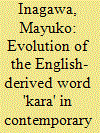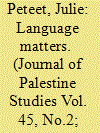| Srl | Item |
| 1 |
ID:
086861


|
|
|
|
|
| Publication |
2009.
|
| Summary/Abstract |
Winston Churchill once said that India is merely a geographical expression-no more a single country than the equator. His colonial assumption was that the Indian nation was a creation of the British, and that prior to it there was only collection of competing diversities-linguistic, ethnic, religious, regional, and political.
|
|
|
|
|
|
|
|
|
|
|
|
|
|
|
|
| 2 |
ID:
117502


|
|
|
|
|
| Publication |
2012.
|
| Summary/Abstract |
Language is not static, but is constantly changing. This study explores the linguistic evolution of one loanword in contemporary Japanese over place and time using a corpus-driven approach, with special reference to word usage and frequency. Taking the English-derived word kara, which corresponds to 'colour' in English, as an example, it aims to identify how and to what extent (a) the application and implications of kara in Japanese have diverged from its counterpart in English (i.e., over space) and (b) the frequency and usage of English-derived words in the Japanese language changed over the 15-year period between 1991 and 2006 (i.e., over time). These goals are achieved through an analysis of corpora consisting of Mainichi shimbun articles published in 1991 and 2006. The study's main argument is that both place and time are significant factors in language change and dynamic mechanisms involving both the donor and receiver languages are at work in creating culturally-specific usages of the word. The study also discusses that such change involves both linguistic and extra-linguistic factors.
|
|
|
|
|
|
|
|
|
|
|
|
|
|
|
|
| 3 |
ID:
101358


|
|
|
| 4 |
ID:
144590


|
|
|
|
|
| Summary/Abstract |
This article explores the linguistic repertoires and conceptual categories that are discursive workhorses in the task of informing U.S. public opinion and shaping policy on Palestine. It situates language commodification in a modern settler-colonial context as it intersects with corporate public relations. The article probes two sites of knowledge production and circulation: the media and the academy. It argues that, ultimately, the media's discursive strategies are handmaidens of violence, enabling and legitimizing colonial relations of displacement and domination. Shifting to academic discourse, particularly anthropology, the article engages with a few selected terms to explore emerging and alternative ways of conceptually framing Palestine.
|
|
|
|
|
|
|
|
|
|
|
|
|
|
|
|